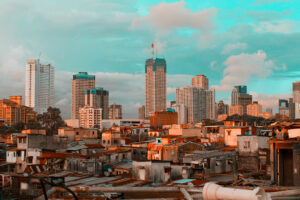By Juaniyo Arcellana
WHEN first we moved to the city shortly after the turn of the millennium, we tried our best to take mental notes of the landmarks to help navigate through the maze of a new environment — the grocery, schools, jeepney stops and routes, church, and market. One of the worthy guides at the outset was the neighborhood barber, whose clients included professional basketball players, who as the wont of others in his trade had a ready analysis on politics, sports, other current events not necessarily limited to the barangay, while snipping hair, or whatever was left of it.
“Have you ever tried it,” he said, “jogging in the mental hospital compound nearby?”
This remark nearly gave birth to a song, “Jogging sa Mental,” whose lyrics never got out of square one, and since then there were other barbers, other sundry exercises, mostly walking, sometimes past the mental compound and its rows of acacia trees and baletes where the demons of the distressed behind those high walls take refuge, or so old folks like to believe.
Been in this city for more than 20 years, but the three spent during the pandemic, give or take a few months, were harsh. It might be an understatement to say the landscape changed or went through constant rearrangement — stores and businesses closed or moved shop, others sprouted in their place, only to go through their own evolution from hole in the wall to mom-and-pop startup, to pseudo establishment that could never even dream of becoming a POGO.
Needless to say, there was an online renaissance. One son who was forced to work from home had to purchase gadgets just to boost the internet connection, only to give up and switch providers altogether, else he’d likely be laid off. Recently the same phone company sent a notice that they’d “temporarily be disconnecting” the landline for nonpayment of dues for a phone that has been out of order for months.
Catch 22: pay or your phone gets disconnected versus why pay for a phone that isn’t working? Besides, there’s Viber. But surely it is a great disadvantage when ordering delivery if there’s no landline. Willing to wait? While the muzak plays on.
Better to venture out into the streets again now that hardly anyone wears face masks anymore and you can finally see their faces and expressions, smell their bad breaths as they speak for this or that candidate, though there are still rare days when you miss everyone looking like a holdupper — don’t stand so close to me.
In the second iteration this year of the mammoth book fair Big Bad Wolf, held in nearby Glorietta if we be allowed to cross the Guadalupe bridge for a second from Tiger City, we stumbled across the pocket book Psychogeography by Merlin Coverley, which could well sum up what we’ve been trying to do in recent writing exercises, including this one.
Not exactly a philosophy but a means of approaching things with a clear enough head, specifically in modern and postmodern neighborhoods through which the writer walks in a low-key, ostensibly unremarkable adventure of discovery and, who knows, self-discovery.
A number of authors are mentioned, several familiar from high school literature courses like William Blake, Thomas de Quincey, Robert Louis Stevenson, whose Dr. Jekyll and Mr. Hyde is cited as a prime example of how London’s streets are never what they seem, or the streets of any city for that matter, e.g., Mandaluyong in the 21st century.
Establishments that have closed shop since the pandemic include the Monterey meat shop across the condominium along Boni; the PLDT headquarters, also on the same avenue, in front of Rizal Technological University, the building resembling a dirty white elephant; Masterpiece auto shop where we would go for quick purchases for change oil and tune-ups; while the LBC moved to a much smaller space a block away with the onset of e-wallets and digital kwarta padala.
Also, the public hospital, which road had been blocked off during the time of coronavirus, was finally closed down and moved to Martinez, one of those roads that emanate like spokes from a wheel that is Maysilo or municipal hall.
There’s a new Potato Corner near the corner of Barangka and Boni, a couple of Dali groceries where German and Vietnamese beers are at a bargain, some new panciterias where hopefully the servers and waiters don’t sleep off the lax hours.
We’re still reading through Coverley’s book, between forays to the neighborhood for the usual chores and errands, but this was never meant to be a review. Just an update on this eastern part of the metro, where once we dreamed of putting up a community paper, the Mandaluyong Sun. There are too many newspapers though, more than enough to wrap smoked fish or wipe windshields in ambulant carwashes with.
Juaniyo Arcellana is a semiretired/senior desk editor at BusinessWorld’s sister publication The Philippine Star. Thirty years ago he had a sports column called The Mopman in BusinessWorld.
